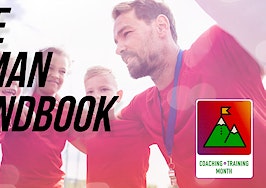 In today’s virtual, work-from-home environment, agents are seeking training and coaching in entirely new ways. In August, we’re laser-focused on what defines good coaching today and how to get the most out of it.
In today’s virtual, work-from-home environment, agents are seeking training and coaching in entirely new ways. In August, we’re laser-focused on what defines good coaching today and how to get the most out of it.
This year has provided plenty of headwinds for the real estate industry, including the coronavirus derailing the spring homebuying season, Great Depression-level unemployment numbers, fears about an impending housing crisis, and a seismic shift to completely digital transactions.
The latest round of earnings calls revealed the difficulty in battling those headwinds, with some of the industry’s biggest brokerages, including Keller Williams, reporting annual declines in transactions and sales volume. Despite the dip in metrics, leaders lauded agents for stepping up to help their clients and communities.
“They have found opportunities to help people buy and sell homes, all while playing a critical role in their communities,” KW CEO Gary Keller told Inman in early August. “They are calling up their neighbors and simply asking, ‘How are you? How can I help? That can have a profound impact.”
One of the leaders behind that impact is KW MAPS Coaching Vice President Monica Reynolds, who spearheaded the May launch of BOLD Pivot — a four-week program that guided agents through a virus-torn market.
Reynolds sat down with Inman to explain the backstory of BOLD Pivot and provide insight on how brokers can quickly adjust their training and coaching to address today’s issues. This interview has been edited for length and clarity.
Inman: Thanks for giving me some of your time today, Monica. I read your biography and you’re a woman who has managed to always stay ahead of the curve. How can agents build that skill, especially in a market like this?
Reynolds: The key thing that’s really important is when an agent understands the real estate industry at the highest level, so you’ve got to study and know your market stats on a daily basis. So you’re looking at what’s listed, what’s pended, what’s closed, price reductions, list prices and sold prices. And then [you must look at] days on market so that you can see a shift coming.
We’ve had an incredible July, and it seems like every agent has had the best July of their entire career. With that said, the second key would be understanding the economic status of the housing market. We’ve still got a shortage. Unfortunately, one out of three [Americans] in July did not make their mortgage payment or their rent payment.
We don’t have August statistics, but I’m not sure that it’s going to change much differently. So they’ve got to really understand those markets and so they’re strategizing all the time and getting ahead of the ball.
Another thing that’s really critical, is having a strong [customer relationship management] platform because a database is really an agent’s only asset. A lot of agents, unfortunately, are not paying attention to it at the highest level. When you have a CRM with an [artificial intelligence] solution that helps your business, contains your business goals, a pipeline of your leads, and smart plans with market updates, the CRM can do a lot of the heavy lifting.
What does it mean to use a CRM at the highest level? How would that play out in an agent’s day-to-day schedule?
The key thing is that you’re constantly growing your CRM. You’re adding three to four new contacts every single day and they have to be complete — name, address, phone number and email. If they’re not getting complete contacts, then you’re building a wishy-washy kind of database.
The second thing you have do is design a marketing program. I recommend agents provide at least one video of value. It’s not saying, “Who do you know? Do you have a referral?” It’s saying, “Here’s what you need to know about the market. Or if you have an interest rate over 4 percent, the current interest rate is 2.7 percent. Call me and let me help you with a refi [as] part of my customer service.”
There’s nothing in it for the agent other than building that customer experience. Are you sending out timely value, emails? Are you doing things that make your database have value? One of the key things that I’ve always instructed and I’ve been doing this for almost 40 years, is that you create a field in your database with a dollar sign.
So if I sold you a house, Marian, and I earned a commission of say, $5,000, I put $5,000 in there. Two years later, if you and your husband decide that you want to move and I sell you another house plus I sell your listing, and I make another $12,000. So now you’re worth $17,000.
If I go to step out of the business, my database is incredibly valuable with those dollar signs attached to people in that database. Nobody takes the time to really rank their clients in value. If you have 100 loyal clients that give you a referral every single year, just think of the value proposition that is.
You should work your database with a market plan, you should work your database as far as who are your best clients. You should be looking at your database every day, and you should have a very specific marketing plan between now and the end of the year.
Speaking of pivoting and creating plans, could you touch on how Keller Williams has adjusted its training and coaching programs to help agents get through such a crazy time?
On March 13. I remember exactly — I’m standing in the doorway, talking to some of the coaches in BOLD and I said, “We’re not going out.” We had planned a [different] launch and we had probably several thousand people signed up. I said, “We’re canceling it. We’re all done because we’re all going home to work. We need to figure out a platform and a big one. We need to rewrite BOLD and call it BOLD Pivot.”
I worked with Gary Keller on this and we needed to basically put our arms around the agents because this is nothing anybody has experienced. Part of it is mindset, and part of it is scripts to work with your clients to keep them engaged with the “I Care” calls. We put out a whole book of MAPS Pivot scripts on how to engage with a seller by calling to check-in, what to do if they want to sell but can’t, and the safety protocols we set up if they’re ready to sell.
And so we were able to really engage the agents at a high level and we had over 41,000 people sign up. What was great, though, is that our coaches rewrote all of the material. We had a lot of stuff we were dealing with in pivoting constantly. The digital world has really opened up a new world to us to get to more agents who can’t drive to a market center or don’t want to spend the time flying to a market center. It was great.
You’ve mentioned “mindset” a few times. Could you provide more insight into the importance of coaching agents to have a better mindset?
Your mindset, what’s between your ears, determines how productive you’re going to be that day, and what you say to yourself. We’re really big believers in affirmations and we’re really big believers in writing a gratitude book. We’re really big believers in overcoming limiting belief systems that are in your head, such as “I can’t do that or I don’t want to bother them.”
It’s about pushing through limiting beliefs and coming in with a mindset of service. A mindset of “How can I help you?” versus “Who do you know that I can meet or I can buy or sell a house with?” When you switch your mindset that you are into making contributions, business comes your way.
For example, here’s how I coach an agent. Okay, so I will say to an agent, “Okay, so here’s the thing. You’re going to probably feel like, ‘Oh my gosh, you know, the sky is falling.'” So I want you to make a phone call to cheer someone up. Say, “As part of my customer service, I care about you guys. I only wanted to call and see how you’re doing. Do you need anything? Is everything okay? Do you need groceries? What can I help you with?”
When you come from an uplifting conversation to help someone, you automatically get uplifted. So we have every agent to make four hours [of] “I Care” calls. There were agents that were picking up medications, going and bringing [clients] toilet paper, and it created this amazing new experience for the client that we’re just not real estate agents.
I’ve definitely experienced that in my own life — mindset does make a difference. So, what advice would you give to brokers and leaders? How can they mimick what KW did in terms of training and coaching?
We pivoted hard and strong, and we look at what the market needs are for an agent. In asking that question, one of the things I always say is you must have an entry-level for everyone when you’re building a coaching company. [For example], if you’re a brand new agent, we have coaching for you that starts at $49. [Our levels] are based on production so [agents] aren’t stressed out financially, and we have strong, strong requirements of where they fit.
Now with that said, we’re looking at where we need to go next. We just launched an REO program with an agent who’s sold 5,000 [real estate owned properties]. We are launching The Millionaire Real Estate Investor Program, and we’re launching a customer experience class based on the Ritz Carlton. Things are evolving and we’re getting ahead of where everybody needs to go in the next few months.
Another thing you want is training that’s available to every single person. If you’re day one, in real estate, we have something very affordable to help you with your business. When you’ve got your business up to a certain level, you go to breakthrough, and then after breakthrough, you go to mastery. If you’re going to build something, you’ve got to be able to appeal to every single person, because the last thing you want to do is have some sort of elite coaching that no one can afford, except for a few. That’s not how you do it.
Lastly, what metrics, outside of sales volume and transactions, can agents look at to determine if they need to move to a new level of training or coaching?
That’s an interesting question. So we have agent training, then we have transformational coaching, and we have leadership coaching [because] a lot of agents want to get into leadership and management.
Transformational coaching is about coaching to the whole person, because sometimes there are blocks that people have like, “Hi, I can only sell 75 houses and I do it every year after year, what’s holding me back?”
We work with those issues and we have some very trained, highly trained coaches that have done a lot of outside training so that they’re qualified to help people with [mental] blocks or challenges. Currently, we have about 225 coaches and we’ve made a really big effort [over] the last year that our coaches are going to be the best-trained coaches ever. Everybody’s really stepped up and it’s amazing the depth of knowledge so they can help with where you need to go next.





